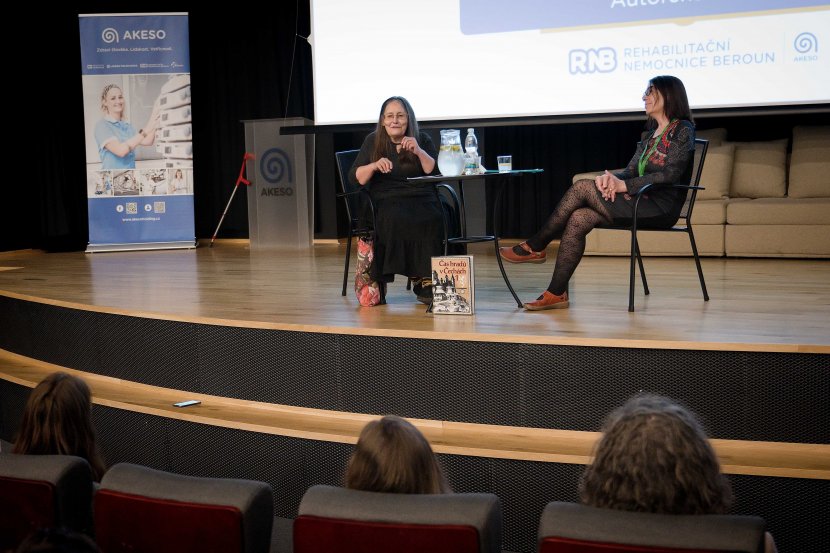Doctor, when did you discover your love of literature and writing?
Before I could read, I used to look at books with illustrations or photographs. Once I mastered letters, nothing stopped me. I had a book in my hand every day. Dolls? They weren't for me to play with like other little girls. They served as actors in stories I made up myself.
What books did you enjoy most as a child? Were you also interested in classic girls' novels?
I was always drawn to adventure, animals, westerns, war stories, history. I read Čapek, Poláček, Vančura, Hašek, Jirásek... just Czech classics from the 19th century onwards. At the age of eleven I had read Rabelais, Gorky, The Silent Don, Victor Hugo, Zola, Dickens, the Dumas family, my father and my son. I devoured World Literature. Occasionally, a girl's book with more pace fell into my hands, but I never took them too seriously.
Do you remember the book that affected you most as a child?
You know I did. Definitely De Coster's Thyl Ulenspigel, Flaubert's Salambo, Vasily Yan's trilogy on the Mongol campaigns, Wu Cheng-jen's Journey to the West. I also had a soft spot for Zane Grey, Cooper, Verne, Kipling, Curwood, Du Maurier, London, Feuchtwanger... I could go on forever. But you know, books are a passion and a curse at the same time!
You're known as a lover of science fiction, fantasy and mystery. How did you get into these genres? Was there no shortage of fantasy literature in the then socialist Czechoslovakia?
Although fantasy was not officially published, it existed in some form under the camouflage of another literary label, most often as a "fairy tale" (I will mention at least Wandering for Plum Scent, but Kafka's The Castle can also be classified as fantasy). This makes the story with a fantasy setting all the more impressive. Domestic science fiction was built on a fairly strong pre-war foundation. In addition to an influx of Soviet SF, often of very high quality (for example, Jefremov), we were also publishing masterpieces by Lem and Bradbury. Their books turned me on to the fantasy genre, as did the novels and short stories of the cult author Ludvík Souček, who is also responsible for my affection for mysteries.
Where do you find inspiration for your stories and characters?
Everywhere in the world around me, in the news, books, movies, but mostly in my own experiences. Sometimes all it takes is two subtle impulses that fit together and suddenly you have a whole story in your head. It's almost magical.
Apart from your own work, you are also involved in popularising the topic of fantasy, giving lectures and talking to the younger generation. How do you perceive the attitude of young authors and readers towards the fantasy genre?
I prefer to use the term fantasy, it includes fantasy, science fiction and horror. The genre is not just escapist entertainment, it is a virtual laboratory for exploring human problems, both current and timeless. It teaches you to think, to create, to explore. Young people love fantasy, they write, draw, make movies, create fanfiction, cosplay, compete. Con and festivals like ComicsCon and AnimeShow are full of enthusiastic young people. Their energy is contagious.
What do you think of the current boom in fantasy and sci-fi series, like Game of Thrones? Is it helping or hurting the genre?
Fantasy is now reaching those who would never have watched such stories before. It often responds to the fears and crises of the contemporary world, such as the popularity of post-apocalyptic themes. Of course, commerce has appropriated the genre, leading to a certain simplification. But at the same time, it means that fantasy is making its way into schools, into science, into literary competitions. Maybe it already has its own category in the Magnesia Litera! And visualization? It opens up other levels of perception, develops the imagination. I choose what I pay attention to. And I can be demanding.
Do you think fantasy can be therapeutic?
Absolutely. Stories are healing. They've been one of the ways people have coped with reality since the beginning of time. It's as true for fantasy as it is for the psychological novel. I know of cases where a book has helped someone through a difficult time or literally saved them. That's why every author who writes with the heart strives for the best possible outcome, even if it's just a "mere" respite novel.
Which authors are you currently reading? Do you have any favourites?
I review, I write professional texts, so I read a lot. I try to keep up with the news, which isn't always easy. Czech and Slovak fiction is at a high level. Recently I was interested in Tomáš Luksch's historical fantasy Sword of Bones. Among foreign authors I enjoy Neil Gaiman, China Miéville, and I was captivated by The Snake Heart Fable by Polish author Radek Rak - beautiful, almost surreal.
How do you spend your free time?
I like to be in nature, in the woods, by the water. But without a car and from the centre of Prague it's not always easy. I like to watch movies and "think" about information, literally like a squirrel with nuts. I collect data, ideas, inspiration, sometimes in case they will come in handy one day. And then of course sometimes I can't find them... but that's part of the creative chaos. Information and stories are my way of life.
PhDr. Františka Vrbenská
She graduated in computer science - library science at the Faculty of Arts of Charles University. She works in the library science in the national programme of preservation of the collections of the National Library of the Czech Republic in Prague. Besides fantasy stories, she also writes professional studies in the field of scientific information and librarianship. Her hobbies besides literature are painting, cooking, swimming and mushrooming. Animal and nature conservation also means a lot to her. She lives in Prague with her family, raised two children with her husband and now enjoys three grandchildren. As she says herself, the love for books and imagination was inherited.














